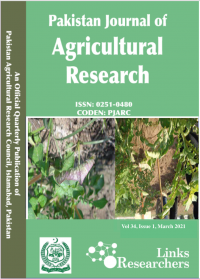Encapsulation of Pumpkin Seed Oil in Alginate Capsules
Encapsulation of Pumpkin Seed Oil in Alginate Capsules
Asma Sohail1*, Kashif Sarfraz Abbasi1, Maryum Arif2 and Fatima Najam1
ABSTRACT
The current research deals with the extraction and encapsulation of pumpkin seed oil (Cucurbita pepo). Pumpkin seeds contain many active ingredients including polysaccharides, vitamins, proteins, essential amino acids, carotenoids, fatty acids like linoleic acid and linolenic acid, lignans, minerals and various phytochemicals. Due to the presence of two unsaturated fatty acids, these oils can reduce their biological activity on heating, volatilization, and other parameters like oxidation and UV rays. This limits the commercial application of these oils. To overcome such problems encapsulation could be a gentle approach. Prior to encapsulation, oil extraction was done by using five different solvents including ethyl acetate, n-hexane, methanol, diethyl ether and chloroform in which ethyl acetate yielded 53% oil. Pumpkin seed oil was encapsulated using gel entrapment i.e. extrusion method and indirect diffusion method using Ca-alginate. Pumpkin seed oil macrospheres showed 91.9 % encapsulation efficiency and 63.0 % loading capacity by direct extrusion method. However, indirect or diffusion method showed 43.0 % and 24.7 %. These results showed that direct method of encapsulation was suitable for oils to achieve maximum encapsulation efficiency and loading capacity at higher concentration of calcium chloride i.e. 0.5 M. Antimicrobial assay clearly indicated that pumpkin seed oil was very efficient against S. aureus, which is a gram positive bacteria. Pumpkin seed oil and control Streptomycin had almost same inhibitory zone that showed its effective use in food. In general, results showed that encapsulation is an effective approach for protection of active ingredients of pumpkin seed oil.
To share on other social networks, click on any share button. What are these?







